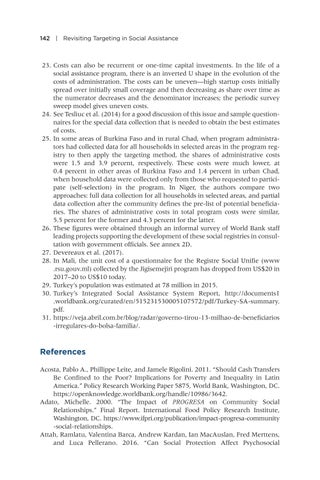142 | Revisiting Targeting in Social Assistance
23. Costs can also be recurrent or one-time capital investments. In the life of a social assistance program, there is an inverted U shape in the evolution of the costs of administration. The costs can be uneven—high startup costs initially spread over initially small coverage and then decreasing as share over time as the numerator decreases and the denominator increases; the periodic survey sweep model gives uneven costs. 24. See Tesliuc et al. (2014) for a good discussion of this issue and sample questionnaires for the special data collection that is needed to obtain the best estimates of costs. 25. In some areas of Burkina Faso and in rural Chad, when program administrators had collected data for all households in selected areas in the program registry to then apply the targeting method, the shares of administrative costs were 1.5 and 3.9 percent, respectively. These costs were much lower, at 0.4 percent in other areas of Burkina Faso and 1.4 percent in urban Chad, when household data were collected only from those who requested to participate (self-selection) in the program. In Niger, the authors compare two approaches: full data collection for all households in selected areas, and partial data collection after the community defines the pre-list of potential beneficiaries. The shares of administrative costs in total program costs were similar, 5.5 percent for the former and 4.3 percent for the latter. 26. These figures were obtained through an informal survey of World Bank staff leading projects supporting the development of these social registries in consultation with government officials. See annex 2D. 27. Devereaux et al. (2017). 28. In Mali, the unit cost of a questionnaire for the Registre Social Unifie (www .rsu.gouv.ml) collected by the Jigisemejiri program has dropped from US$20 in 2017–20 to US$10 today. 29. Turkey’s population was estimated at 78 million in 2015. 30. Turkey’s Integrated Social Assistance System Report, http://documents1 .worldbank.org/curated/en/515231530005107572/pdf/Turkey-SA-summary. pdf. 31. https://veja.abril.com.br/blog/radar/governo-tirou-13-milhao-de-beneficiarios -irregulares-do-bolsa-familia/.
References Acosta, Pablo A., Phillippe Leite, and Jamele Rigolini. 2011. “Should Cash Transfers Be Confined to the Poor? Implications for Poverty and Inequality in Latin America.” Policy Research Working Paper 5875, World Bank, Washington, DC. https://openknowledge.worldbank.org/handle/10986/3642. Adato, Michelle. 2000. “The Impact of PROGRESA on Community Social Relationships.” Final Report. International Food Policy Research Institute, Washington, DC. https://www.ifpri.org/publication/impact-progresa-community -social-relationships. Attah, Ramlatu, Valentina Barca, Andrew Kardan, Ian MacAuslan, Fred Merttens, and Luca Pellerano. 2016. “Can Social Protection Affect Psychosocial


